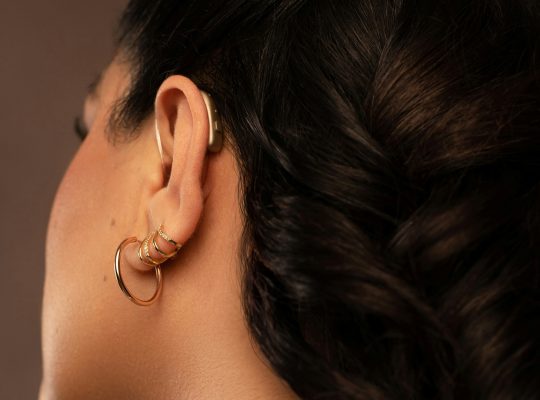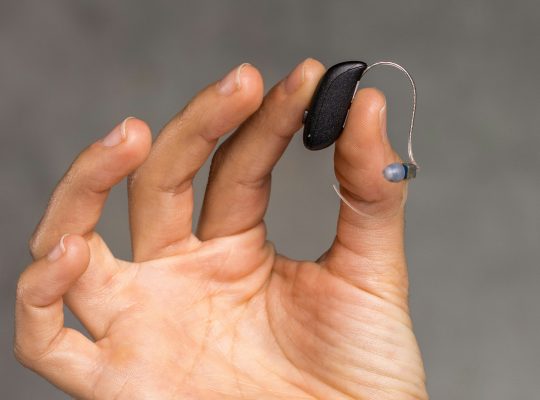We all know that food affects your heart, skin and energy levels. But did you know that what you eat can also have an effect on your hearing? Yes really! Your ears are not separate from the rest of your body. Rather, they are sensitive to what is going on in your body – and therefore to what you put on your plate.
In this blog, we dive into the world of food and hearing. What can you eat to keep your ears healthy? What vitamins and minerals play a role? And are there things you’d better leave out if you want to protect your hearing?
Your hearing depends on proper blood flow
Let’s start at the beginning. Your ears – especially the inner ear – depend on good blood flow. That’s where oxygen and nutrients enter, ensuring that your auditory nerve can do its job properly. If your blood vessels become clogged (due to high cholesterol or high blood pressure, for example), it can eventually affect your hearing.
That may sound exciting, but the good news is: you can do a lot yourself. Eating healthy not only helps your heart and brain, but so does your hearing.
The superstars: these nutrients are good for your ears
There are a number of vitamins and minerals that scientific research shows contribute positively to your hearing health.
Folic acid (vitamin B11)
Folic acid helps make red blood cells and promotes blood flow – just what your ears need. There is even research suggesting that people with enough folic acid are less likely to develop hearing loss.
What to eat. Think green leafy vegetables (spinach, kale), citrus fruits, avocado, legumes and whole grain cereals.
Vitamin B12
B12 deficiency is associated with hearing loss and even tinnitus (ringing in the ears). B12 is important for your nerves – and your auditory nerve is one of them.
What to eat. B12 is found in animal products: meat, fish, eggs and dairy. Are you a vegetarian or vegan? Then it’s smart to supplement B12 with supplements.
Magnesium
Magnesium protects the tiny hair cells in your inner ear from damage, especially when exposed to loud noises. This is why it is sometimes seen as a “hearing protector” at festivals or noise at work.
What to eat. Almonds, bananas, avocados, spinach, whole grain products and dark chocolate are good sources.
Omega 3 fatty acids
These healthy fats (known from oily fish) improve blood flow, including in your ears. Research shows that people who eat fish regularly are less likely to have hearing loss later in life.
What to eat. Salmon, mackerel, herring, sardines – and if you are not a fish lover: walnuts, flaxseeds and chia seeds.
Zinc
Zinc supports your immune system and helps your body fight inflammation. For some hearing problems, such as sudden hearing loss or recurrent ear infections, zinc may be able to help with recovery.
What to eat. Oysters (are real zinc bombs), but beef, pumpkin seeds, lentils and nuts also contain zinc.
What you better cut down on
In addition to nutrients that are good for your hearing, there are also things that can actually have a negative impact. It’s often about balance here – you don’t have to cut anything out completely, but a little awareness can’t hurt.
Too much salt
Salt increases your blood pressure, and that does not help the fine blood vessels in your ears. Especially people with Ménière’s disease (in which hearing loss and balance disorders occur) often find that salt affects their symptoms.
Be careful with ready meals, chips, soups from packets and fast food – they often contain more salt than you think.
Sugar and fast carbohydrates
Excess sugar can promote inflammation and disrupt your blood sugar – both of which can indirectly contribute to hearing problems. People with diabetes are especially at extra risk for hearing loss. So sugary soft drinks, cookies, candy and white bread are better in moderation.
Caffeine and alcohol
There is no rock-solid evidence that coffee or wine are directly harmful to your hearing, but excessive intake can worsen tinnitus in some people. Are you prone to tinnitus? See if it helps to drink less coffee, cola or alcohol.
Extra tip: stay well hydrated
Drinking water is not necessarily nutrition, but it does belong here. Adequate fluids ensure good circulation and help your body eliminate waste products. Your inner ear needs moisture to function optimally – so don’t forget that glass of water!
What about supplements?
A healthy diet remains the foundation, but in some cases a supplement may make sense. For example, if you eat little animal products (think B12), do a lot of sports (magnesium) or are elderly and no longer absorb everything well through food. Do always consult your doctor or audiologist if in doubt – supplements are not a panacea, but can be a valuable addition.
Your hearing deserves care as much as your heart or skin
We often don’t think about hearing problems until it’s already too late. But your ears are just as sensitive to lifestyle as the rest of your body. By eating consciously, you can keep them healthy and even prevent damage.
The great thing is: many of the foods that are good for your hearing are also good for your brain, your heart, your eyes – and yes, for your mood, too.
So that salad with spinach, salmon and avocado? That’s not a trendy choice, that’s pure ear love.
In conclusion
Your hearing is not a stand-alone sense. It’s intertwined with your entire health. And in that, nutrition plays a bigger role than you might have thought. So the next time you prepare your lunch or plan your dinner, think about your ears. They’ll thank you – even if they don’t say so out loud.
Want to learn more about how to keep your hearing healthy or are you looking for products to help with that, such as hearing protection or cleaning tools? Then you’ve come to the right place. Feel free to contact us.








